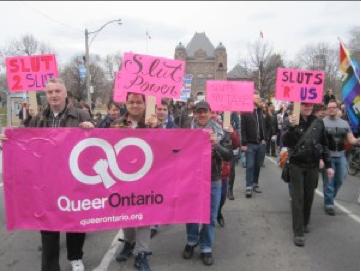
Queer Ontario member David Demchuk. Credit: From Facebook

Nick Mule, chair of Queer Ontario. Credit: Xtra file photo
Twenty-five years ago, Ontario’s gay, lesbian, bisexual and trans community celebrated a major milestone.
On Dec 16, 1986, the provincial legislature passed Bill 7, an amendment to the Ontario Human Rights Code (OHRC) prohibiting discrimination against gay and lesbian people.
NDP MPP Cheri DiNovo (Parkdale–High Park) says the anniversary serves as a reminder of the importance of extending explicit protections to Ontarians facing discrimination, such as fighting for the inclusion of “gender identity” in the OHRC.
Bill 7 came at a time of increased awareness of the need for gay and lesbian rights. The bathhouse raids, known as Operation Soap, made headlines in 1981, and panic surrounding HIV/AIDS continued to escalate. Social discrimination was widespread.
“It is easy to forget that before this turning point in our history, the law said it was fine to deny a rental accommodation, a seat in a restaurant, a hotel room, a job, a mortgage or a membership in a union to someone simply because of their sexual orientation,” DiNovo says.
Queer Ontario (QO) member David Demchuk, who was 25 years old at the time, remembers the moment well. Much like when same-sex marriage was legalized, he says, there was euphoria in Toronto’s gay community — and with it came a sense of pride that gay and lesbian people would now be accepted and protected in Ontario.
“Before the announcement, I remember thinking, This will not happen in my lifetime. Then it did. My whole experience up to that point was that I was a lesser person. I was raised a lesser person.”
Barbara Hall, chief commissioner of the Ontario Human Rights Commission, recalled the moment vividly in an interview last summer: “Word spread, and there were impromptu celebrations at Church and Wellesley.”
After the change, the gay liberation movement kicked into high gear, says Demchuk. “It was a domino effect. So many workplaces had to change, so many schools had to change, so much policy had to change. There’s so many environments that we take for granted are accepting places, but they weren’t at the time.”
Demchuk says even his relationship with his family improved. “To have my identity confirmed by the province, that was a huge moment.”
It made fighting social discrimination – a widely held belief by society that homosexuals were deviant – a bit easier. “My mother’s generation was born in the Depression and grew up through the ’50s. It was understood in society at that time that gay people were lesser.”
“You would be taunted, beaten, shunned, shut out. In the eyes of the law you were not completely a human being. It was a huge acknowledgement,” Demchuk says.
But the victory didn’t come easily, says QO chair Nick Mulé. It was a long and dirty fight.
QO’s predecessor organization, the Coalition for Lesbian and Gay Rights in Ontario, was founded in 1975 as a provincial voice to push this issue forward. Not long after the group was founded, a Toronto gay man, John Damien, was fired from his job as a racing steward for being homosexual.
“He didn’t tolerate that, so he stood up to them,” Mulé says. Damien became the human face of an 11-year campaign for inclusion in the Code.
“It’s quite significant. It was the first time we were recognized legally for our rights. It made Ontario a much safer place to be for lesbian, gay and bisexual people.”
Ontario was the second province in Canada to enact legislation protecting gays and lesbians, Mulé says. Quebec was the first.
More positive change is on the way as Ontario moves forward with the Accepting Schools Act. Although it contains a problematic loophole that means Catholic boards can continue to prohibit students from naming their groups gay-straight alliances (GSAs), the legislation is a monumental first step toward tackling the pervasive problem of homophobic bullying in Ontario schools.
On the anniversary year, DiNovo says she hopes the province continues to push queer rights forward by including “gender identity” in the OHRC and working to ensure all students in Ontario can join GSAs at their schools and live their lives without fear or prejudice.

 Why you can trust Xtra
Why you can trust Xtra


